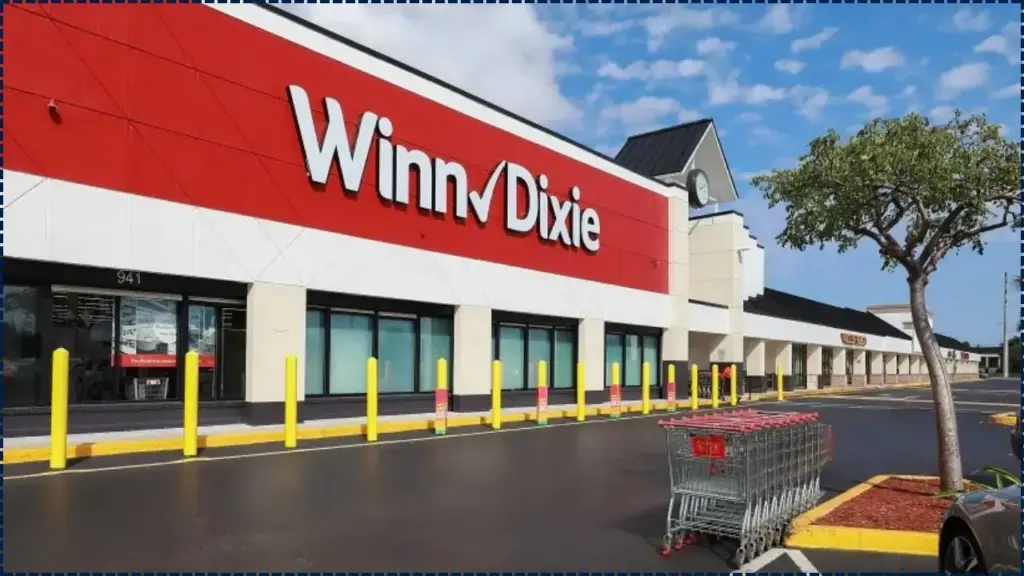Winn‑Dixie, the long-standing regional supermarket chain, said on October 22 2025 that it will close or sell more than 30 store locations across Alabama, Louisiana, Mississippi and Georgia as it realigns its operations to focus on Florida and southern Georgia.

The move comes amid a broader rebrand of its parent firm, Southeastern Grocers (SEG), into a new entity called The Winn‑Dixie Company, signalling a sharpened geographic strategy.
Table of Contents
Winn-Dixie Begins Major Shake-Up
| Key Fact | Detail / Statistic |
|---|---|
| Number of stores to divest or close | 32 Winn-Dixie stores + 8 Harveys supermarkets being sold or closed in four states. |
| States impacted | Alabama, Georgia, Louisiana, Mississippi |
| Core market post-divestment | Approximately 130 grocery stores + 140 liquor stores in Florida + southern Georgia |
| Rebrand timeline | SEG will become The Winn-Dixie Company in early 2026 |
Strategic Realignment of the Winn-Dixie Begins Major Shake-Up
Why the shift?
SEG’s leadership says the decision to exit many stores is driven by the need to concentrate on markets where Winn-Dixie has deep brand recognition and historical strength—namely Florida—and to streamline operations in an increasingly competitive grocery sector. CEO and Chairman Anthony Hucker noted: “As we enter our next century as The Winn-Dixie Company … we are accelerating growth where our roots run deepest.”
The retail environment is under pressure from discount grocers, e-commerce and supply-chain costs. Analysts say regional chains are retrenching to survive. The store-closing and divestiture programme is unusual for a chain that historically expanded across the southeastern United States.
Timeline and process
- In August 2023, SEG announced the sale of its Winn-Dixie and Harveys banners to ALDI. (AP News)
- In February 2025, a consortium led by Hucker and including C&S Wholesale Grocers acquired approximately 170 of the stores back.
- In October 2025, SEG formally announced it would divest 32 Winn-Dixie and eight Harveys supermarkets by early 2026 and rebrand as The Winn-Dixie Company.
Impact on Communities, Employees and Markets
Employees and store operations
The scale of the divestiture means job-loss risk, though SEG pledged support. In its announcement it said: “We will do everything we can to support those who supported us, ensuring this transition reflects the gratitude and respect they deserve.”
However, the impact on employees in closing stores or transferring operations to new owners remains undefined. Local markets may face reduced competition or changes in service when a store is sold.
Consumer and community consequences
In markets such as rural Alabama, Mississippi or northern Georgia, the exit of a Winn-Dixie store could leave fewer grocery options, particularly in underserved areas. Some stores are being sold to chains such as Piggly Wiggly and Food City. The sale may cushion impacts but transitions can lead to disruption in supply, pricing or product assortment.
Competitive dynamics
By pulling out of less-profitable or non-core regions, Winn-Dixie may allow competitors to gain market share. At the same time, concentrating on Florida and southern Georgia may allow more targeted investment in store upgrades, service innovation and brand differentiation.
Financial and Business Implications
The move positions Winn-Dixie to sharpen its capital allocation. Spending saved from divested markets may go into store remodelling, private-label expansion, liquor-store growth and e-commerce initiatives such as third-party grocery delivery and return kiosks.
Industry analysts view the strategy as defensive but necessary. “Regional supermarket chains must pick markets carefully and withdraw from weaker geographies to remain viable,” said retail analyst Sarah Kim of UBS Global Research.
However, the transition carries risk. Execution risk remains high, and competition from national discount chains and online grocers remains intense.
Historical Background & Brand Significance
Winn-Dixie was founded in Florida in 1925 and became a prominent grocery chain across the Gulf Coast and Southeastern U.S. Over decades it weathered mergers, competition and bankruptcy.
Giving up states where it has operated for many years is significant from a legacy perspective. The rebrand to The Winn-Dixie Company is intended to mark a renewal of the brand’s identity and focus.
What’s Next: Timeline & Strategic Focus
- Store transitions (sales or closures) are expected to be completed by early 2026.
- Post-divestment, the company will operate around 130 conventional grocery stores and 140 liquor-store units in Florida and southern Georgia.
- The company plans to upgrade stores, expand its own-brand products and pilot new services (including pickup/delivery innovations) in its core region.
- Alarm will be felt in departed regions for employees, suppliers and consumers; close monitoring of competitor responses will follow.
“The companies that act decisively and broadcast a clear strategy will survive the current retail shake-up,” said Kim of UBS.



















